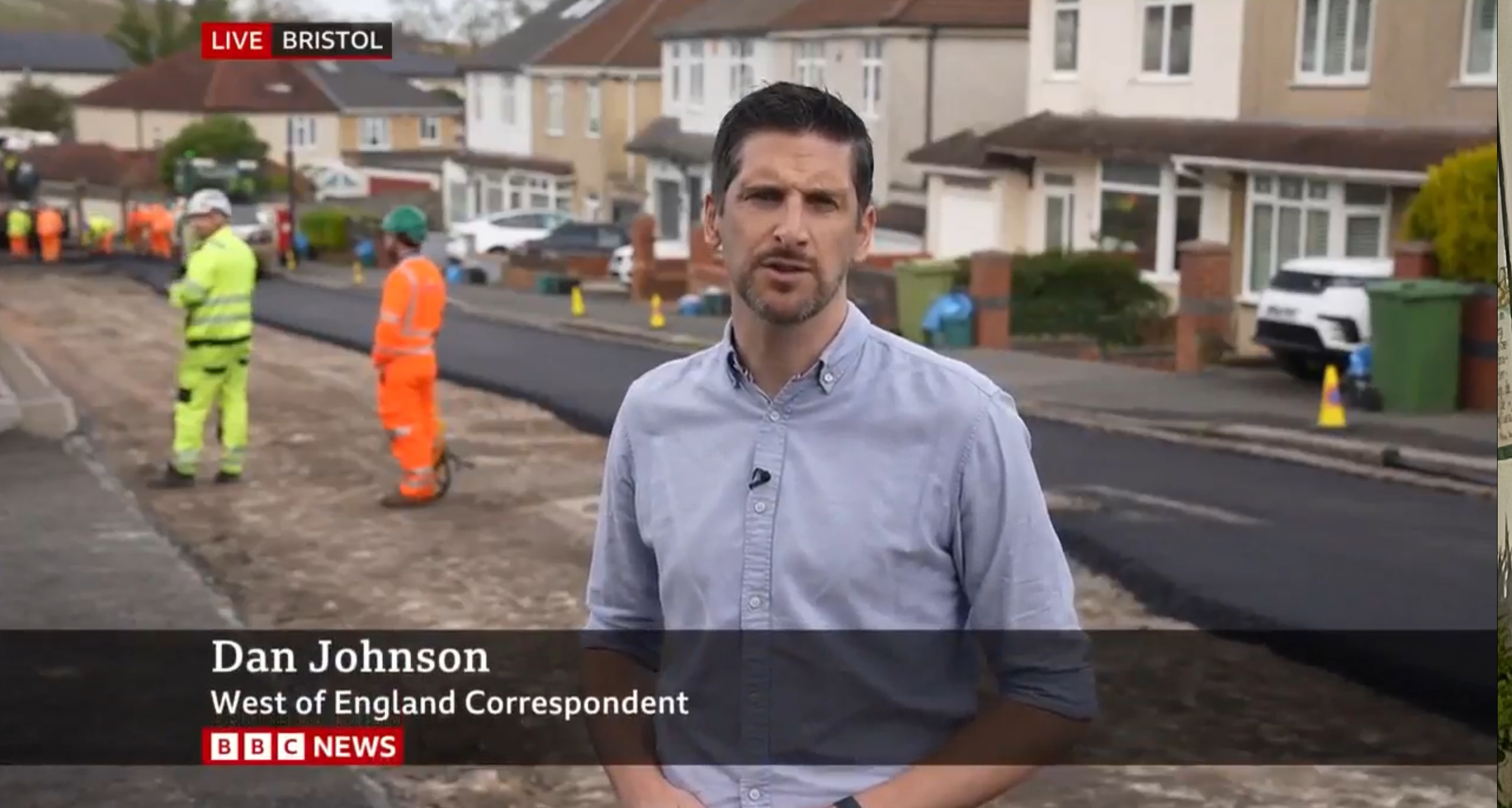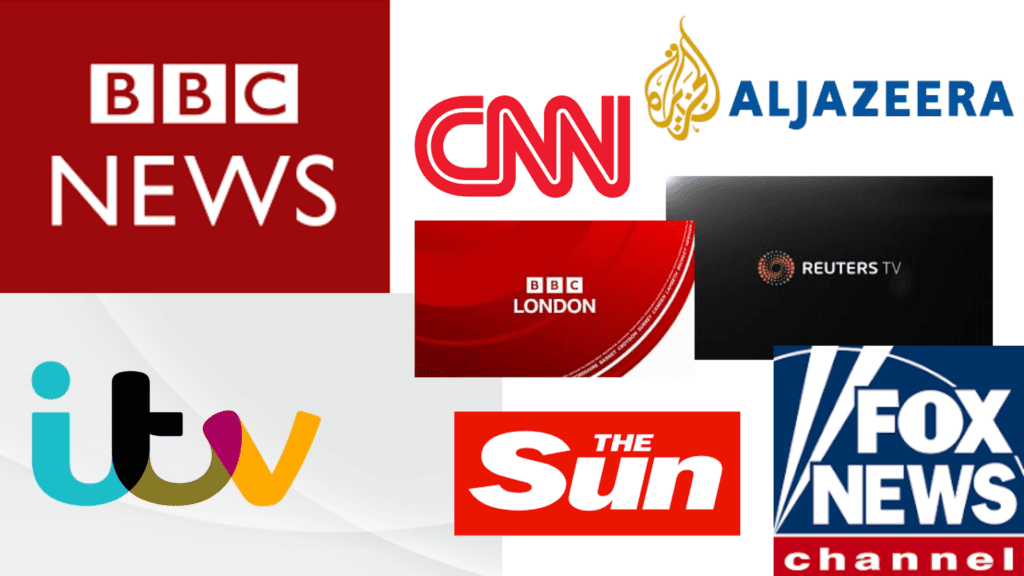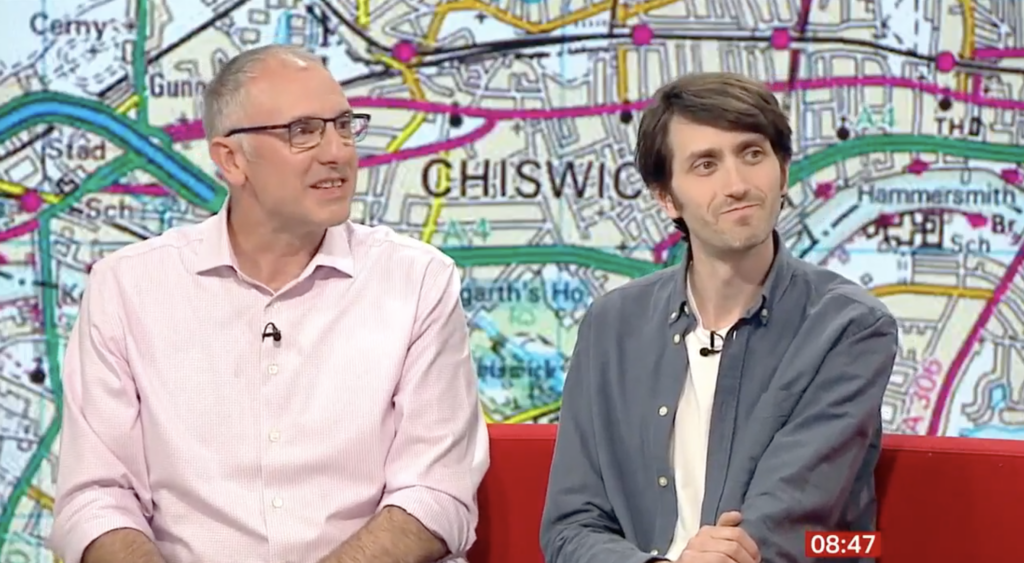Television media relations is often considered to be the icing on the cake.
Clients love TV because of its massive audiences and influence.
As former broadcast journalists and a leading UK TV PR company, securing opportunities for clients
on television is one of our greatest strengths.
What is television PR?
Television PR is earned, editorial coverage – for a brand, a company or a person – secured mainly on TV news and daytime programming, as part of a PR strategy. TV PR’s value is in the extensive audiences TV attracts. Millions of people watch TV every day, so you are communicating your key messages to the broadest possible audience.
As a visual and audible medium, television engages in a way no other media does. It triggers emotions which increases engagement. It’s also influential. Television is so often first with a story, so other journalists, working for radio, print and online outlets, will watch it to source stories they will then run themselves.
For us, Television PR includes securing coverage on national and regional television stations, in the UK and globally.
Our expertise
As journalists we planned, produced and reported on TV stories ourselves, therefore have extensive knowledge of what it takes to get a story on-air.
Our experience means we understand what makes an outstanding visual story. It’s also given us excellent contacts in all the UK’s national and regional television stations, as well as many abroad.
As a leading UK TV PR agency, we generate stories we know will appeal to broadcasters and place them editorially on television. We can also offer a reactive approach, creating opportunities for your spokespeople by hi-jacking other stories in the news agenda.
We will tell you what ingredients you need to successfully place a story on TV. This includes which channels and programmes are most suited to your target audience along with suggestions for spokespeople, filming opportunities and locations.

Pictures, pictures, pictures....

The first question a TV news planner or journalist will ask is: what can we film? If filming is difficult or time consuming a follow up question might be: Is there any B-roll? B-roll is around 6-8 minutes worth of roughly edited footage that is produced by television PR agencies like Shout! Communications on behalf of a client; it’s distributed to broadcasters free of charge and any copyright issues for them to re-edit in their own style. Read more about B-roll here.
B-roll has become invaluable since the start of the pandemic, which has made it more difficult for broadcasters to go out and film their own material. As restrictions ease however some crews are going out on location – and that’s where our television PR expertise can help you provide them with the best pictures.
Other top tips for securing television PR coverage
Case studies
Case studies are a great aid in the quest to secure television coverage. They can make a TV PR campaign feel relevant to the audience and they’re often very useful “wallpaper” pictures. A research story, for example, may be difficult to illustrate but if you have a case study you can say: “This woman is one of the X thousand people diagnosed with this condition each year….”
Sum your story up in a sentence
As we said above, most news bulletins are only on for about half an hour and individual stories are short – 30 seconds if it’ a newscaster “voice-over”, around 1.30″ for a pre-recorded, edited package and just a couple of minutes for a live interview. Broadcast journalists work quickly – they don’t have time for lengthy explanations. So, being able to sum up a story in a sentence – without drawing breath – is a good test of whether your story is TV ready.
Hold your nerve
Television is an unpredictable beast! The decision to run a story on television is rarely made too far in advance. You might not even know until the day of the campaign. That’s because all our PR generated stories are competing with organic breaking news. Even lifestyle programmes, such as ITV’s This Morning or the BBC’s Morning Live are not exempt from this. So you really have to hold your nerve. In our experience as a TV PR agency, it’s important to remember television is never a given until the story has gone out on-air!
Types of TV PR coverage
National TV
The earlier in the day, the better the chance of PR coverage on national TV. That’s because, whilst breakfast shows will drop a story because a better and/or breaking story has come in, a certain proportion of the programme has to be planned ahead – just because of when it goes on-air.
Regional TV
It’s called regional TV for a reason. As part of their remit, regional TV requires local angles, spokespeople and statistics, where relevant. You can’t expect a re-run of a national story. BBC London and ITV’s London Tonight may adapt a national story that’s happening in London, but give it a London twist. Aside from that each region really needs to own their own story.
Global TV
We sell-in to English speaking TV stations and news wires across the world and have particular expertise in the USA. In our experience stories work best when accompanied by B-Roll.
Online TV channels
Talk TV was the first to move from being a linear TV channel to an online one. This happened in May 2024 when it rebranded as Talk, and can now only be viewed via a streaming service on its website, app and YouTube channel. Piers Morgan’s UnCensored channel on YouTube is another example, as is The Sun newspaper’s channel, also on YouTube

Target audience
TV can also be a great way to reach a relatively targeted audience; for example, if you want to reach women, securing a slot on ITV’s Good Morning Britain, This Morning or Lorraine is the holy grail. Alternatively, if you want to reach industry professionals and board directors, perhaps business slots on BBC Breakfast, Newsnight or News Channel are the way to go.
Spokesperson
Your spokesperson is crucial to the success of your television campaign and, in order to maximise coverage, it helps to have more than one. Broadcasters have a bigger appetite than ever for live interviews and PR generated stories are more likely to happen earlier in the day than later. So having multiple spokespeople means you can facilitate simultaneous interview requests. For example, once guests are fully welcomed back into studios, if you have interest from BBC Breakfast we would recommend having one spokesperson in London and another in Manchester. This means you’ll be able to accommodate both Breakfast and other national television opportunities.
Before committing to a spokesperson, it’s important to make sure they are happy to be as flexible as possible. Will they commit to live interviews as well as pre-recorded ones? This is an issue that can often come up, so it’s good to check beforehand.
Will they get up early and stay up late? As we’ve said, PR generated stories have a better chance of getting on air earlier on in the day, when there’s less competition for news stories – but if the story is strong it may last all day. As with anything, better to warn a spokesperson ahead of time.
Sometimes the perfect spokesperson does not work for the brand you’re promoting, but is a paid-for brand ambassador, sometimes known as a third party spokesperson. For more about how we can help source a celebrity or brand ambassador, click here.

How television PR and radio PR differ
- There are a lot more radio stations in existence than TV ones. That’s why we guarantee a minimal level of radio coverage, but can’t do the same for TV. To mitigate your risk, however, we do offer some partial pay-on-results-packages. For more details on this email hello@shoutcommunications.co.uk.
- Television is logistically more difficult than radio. Beginning with the pandemic, broadcasters got used to conducting interviews online, mainly Zoom and FaceBook (for BBC radio particularly). But TV journalists are now encouraging their guests to do an interview in a studio. That means you might be needed in London for ITV’s GMB (Good Morning Britain) or Sky News – but BBC Breakfast might also require you in Salford near Manchester and Channel 4 News is in Leeds.
- Some stories suit one medium better than the other. Research stories, for example, sit well with radio stations – they can provide good talking points. But television is less keen, not least because they would need to illustrate the research.
Next steps
We have some key questions to ask you, to see whether your story is television PR worthy.
- What is the story? Can you sum it up in a single sentence, as if you are telling a friend.
- Does it have talkability? Stories need to engage and entertain. They need to be significant/interesting/unusual/funny to stand out from the crowd – rather than dull and “so what”…..
- What can you see? Is there a stunt, a product or a case study that broadcasters can access and film for themselves. And/or is there B-roll, pictures that TV journalists can use to edit together a video package about the story.
- Who and where are the spokespeople? Since the pandemic a lot of interviews still take place via Zoom. But increasingly TV news programmes are inviting guests back into their own studios. That means, if you want to be on UK national television, you need a spokesperson in London and sometimes Manchester (for BBC Breakfast) and/or Leeds (for Channel 4).
Securing coverage on television is difficult. There are far fewer outlets than there are for radio, so it’s important to have all your ducks in a line before approaching any TV PR company.
If you’re not sure whether your television PR campaign is strong enough get in touch to chat it through.
Thinking of launching your own TV PR campaign?
FAQs
Unlike radio, television is too unpredictable for us to guarantee coverage. News and daytime programming (where you have the best chances of coverage) are time limited and the running order will always give way to organic, breaking news stories.
That said, as former TV journalists ourselves we can give you a very good steer on whether your story is likely to make it on-air. Call it a gut feeling, but when you’ve worked in a TV newsroom and made the decision about whether to take a PR generated story or not, you can normally call it.
Having a strong top line, good visuals and a peg for the story (a reason to run it on a particular day) will dramatically increase your chances.
Despite the perception that it is, our packages offer fantastic value for money.
We understand that every client wants to know they’re getting a good return on their money. For that reason we offer television either as a pay-on-results package, if commissioned alongside another of our services. Or, if you want television as a stand alone service we ask for a modest selling-in fee then charge on a pay-on-results basis, up to an agreed ceiling.
Television, more than any other media, has wide reaching audiences, it brings a story to life and it influences other media too. So, in answer to the question, not for what you get!
Some interviews still happen online, mainly on Zoom – a legacy of the Covid-19. But increasingly television journalists prefer their guests to come into their studios. Studio interviews make for better content, both for broadcasters and PR spokespeople. First of all you have body language to respond too; secondly you generally get given a bit more air-time.
Remember, not all TV studios are in London. BBC breakfast is in Salford, near Manchester and Channel 4 News is in Leeds.
At least a week, but ideally more like 7 or 8 working days. The best route to help get a story on television is to get it on a planning list. TV journalists have lots of lists, and it’s easier to get a story on the weekly list than it is the day before, or on the day ones.
We’d be very lucky if that’s all it took; that’s just the start of the process. As a leading UK television PR agency, we use our extensive network of contacts to speak to producers, editors and correspondents in order to clinch the coverage.
Television is very particular about what you can and can’t do. The BBC must adhere to its Producer Guidelines and is not allowed to give any air-time that might look like an advert. The commercial sector meanwhile has its own advertisers, who don’t want to pay rates just to see another brand get airtime for free.
But obviously brands won’t partake in PR activity if they don’t get anything in return and broadcasters, who now rely on on at least some PR generated content each day, know this. But it’s a fine line to be drawn.
Our guidance is to expect one credit per piece of coverage, which could be visual (perhaps in a graphic or a logo that’s in shot) or audible (mentioned by the newscaster). When we sell in we have this conversation with the journalist at the beginning of the process and, where possible, get the arrangement confirmed in writing.
Television opportunities are hard won so it would be a shame not to make the most of each one you get. Media training teaches you how to combine two things: how to give a journalist the content they want, at the same time as communicating your key messages.
The majority of corporate spokespeople on television ARE media trained. Don’t stand out for the wrong reasons.
The earlier in the day, the better the chances of coverage. That’s because as the day goes on, and the world wakes up, there are more organic stories to compete with. That’s why you’re more likely to get coverage on breakfast shows, such as BBC Breakfast, ITV’s GMB or Sky News Breakfast than evening or late night news.
A large proportion of each breakfast show will be arranged the day before. If an organic story breaks early in the morning another story will be dropped to make way for it – but the chances of this happening are only small.
ITV daytime in particular This Morning and Loose Women love an exclusive and fight hard to secure celebrities and personalities to appear on their shows but agreeing to an exclusive can be a high-risk strategy. This is because if there is a breaking news story or a more high-profile guest offered, they are likely to drop your interview – leaving the brand with no coverage.
For news programmes like BBC Breakfast or Sky News our advice is not to offer an exclusive but to consider offering some exclusive elements a case study or some data which is only available to them. Having a spokesperson that is not readily available to news outlets is another way of bypassing the need for an exclusive. It’s better in our opinion to secure as much potential coverage as possible rather than putting all your eggs in one basket.
